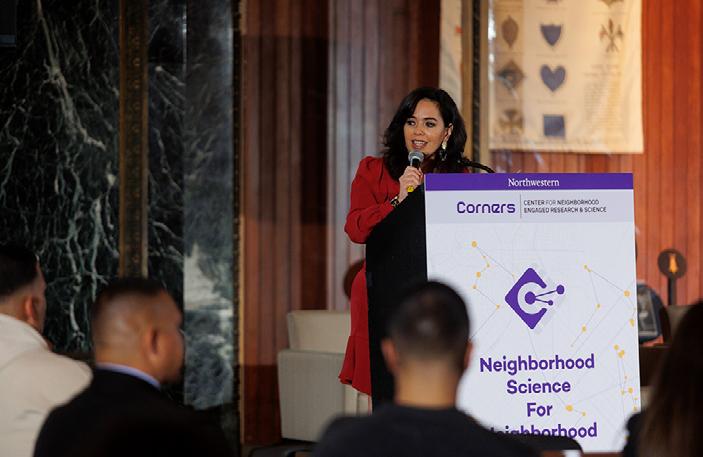
3 minute read
The Ramifications of Ending Race-Conscious Admissions
Lauren Rivera shares her take on the ruling and its impact in elite spaces
On June 29, 2023, the U.S. Supreme Court ruled that colleges and universities can no longer consider race in student admissions. The decision by the court’s 6–3 conservative majority upends longstanding precedent and could drastically impact higher education.
Advertisement
Lauren Rivera is an IPR sociologist and professor of management and organizations at Kellogg. Kellogg Insight reached out to Rivera for her take on the ruling, its impact, and what she hopes to see elite intuitions do in response.
Kellogg editor’s note: This interview has been edited. Rivera’s views are her own.
Rivera: Today is a deeply sad moment, both for the state of diversity in the United States, as well as for me personally.
It’s predictable in some respects, given the popular discourse around these two cases and given the immense DEI [diversity, equity, and inclusion] backlash we’ve seen in the past several years. But it’s still deeply disheartening. This is not just an intellectual thing for me: I have benefited from these policies in my life. Being able to go to Yale was a huge source of upward mobility for me that opened doors and opportunities that are typically closed to people from my ethnic and class backgrounds.
I also think that the decision represents a fundamental misunderstanding or misrecognition of what we know from science about how discrimination works.
Insight: So let’s talk about that. If you look at Pew polling, for instance, there is a lot of ambivalence about affirmative action among Americans, including some Americans of color. As a scientist, what do you see as the fundamental misunderstanding about discrimination?
Rivera: Polling gets at people’s perceptions of fairness, which are based on their own worldview and their own homogeneous social networks. I’m reminded of a study that finds that people drastically misperceive racial progress in this country. In addition, we know from research that we define fairness in a way that is self-serving; what we consider fair is often what we feel would benefit us or our children. Second, affirmative action isn’t only about race. Affirmative action is also about gender! If we took away gender-balancing in college admissions, the composition of elite college classes would likely be between 60 and 80 percent women. Affirmative action on behalf of men is the reason why we have 50-50 gender splits in incoming classes at Ivy League schools. It’s very clear to me that the exclusive focus on race-based affirmative action in these legal challenges and rulings means that this is not actually about ideas of fairness. This is about racial stereotypes and perceived racial threat in the United States.
Insight: The ruling will affect a relatively small number of very elite institutions, which educate a relatively small number of students. Why is it important for us, as a society or as a business community, to care what happens to the admissions processes at a small number of schools?
Rivera: It matters for two reasons. One is that these institutions carry huge weight in terms of access to power in our society, producing a disproportionate percentage of leaders in every sector: leaders in higher ed, finance, medicine, government (including Supreme Court justices!), you name it. Long term, it will decrease the representativeness of those in power unless we adopt other measures to ensure diversity.
In the United States, we have a highly stratified system of higher education. People assume that the prestige of the college or graduate school you attend is a direct reflection of your underlying merit and your capability as a potential worker. I see this in my research so clearly: When I was interviewing people who do hiring for investment banks, management consultancies, and law firms, they would say things like, “The prestige of the university you go to is a direct reflection of your intellectual horsepower.” In fact, some industries restrict recruitment to people who graduate from elite universities. Admissions committees at elite graduate and professional schools likewise take the prestige of a candidate’s undergrad degree as a signal of merit and use it as a basis of inclusion or exclusion.
I hope that in response, employers will expand and look beyond the most elite colleges and universities to find talent. I also hope that elite colleges will consider expanding opportunities. The number of spots in these schools has remained pretty stagnant over time. Why have colleges not expanded enrollment given the increased demand and the amazing level of resources that they have?
Insight: You mentioned that the admissions ruling matters for two reasons. What’s the second?
Rivera: Let me preface this by saying I’m a sociologist, not a lawyer. The ruling does not directly affect companies today, but there will likely be legal challenges to specific types of DEI employment practices on the horizon. Immediately, though, I do think that this ruling will create confusion and fear—among employers and workers—about what is and is not legal when it comes to various DEI initiatives. And fear itself is very powerful.
Lauren Rivera is professor of management and organizations and an IPR associate.










